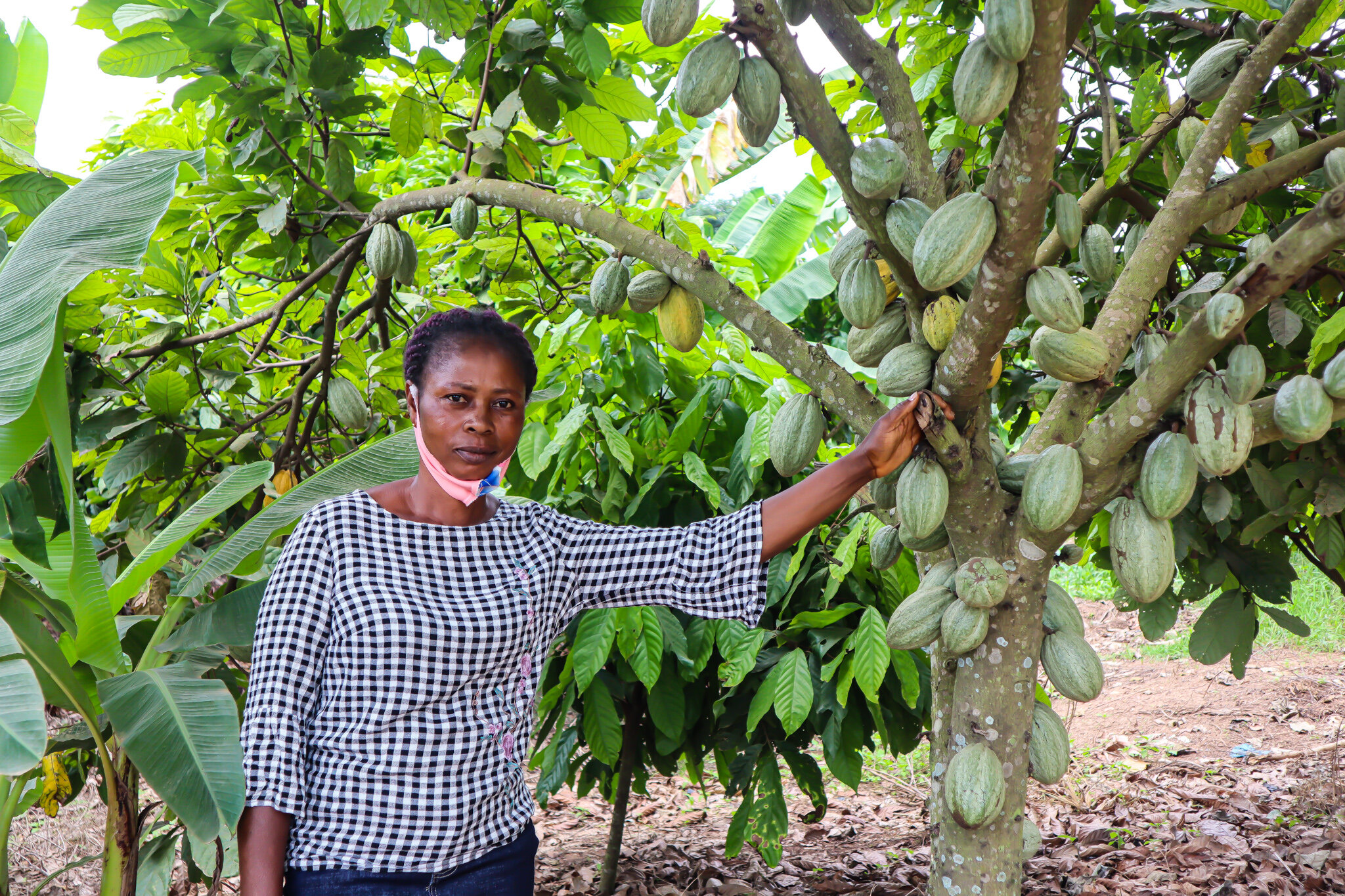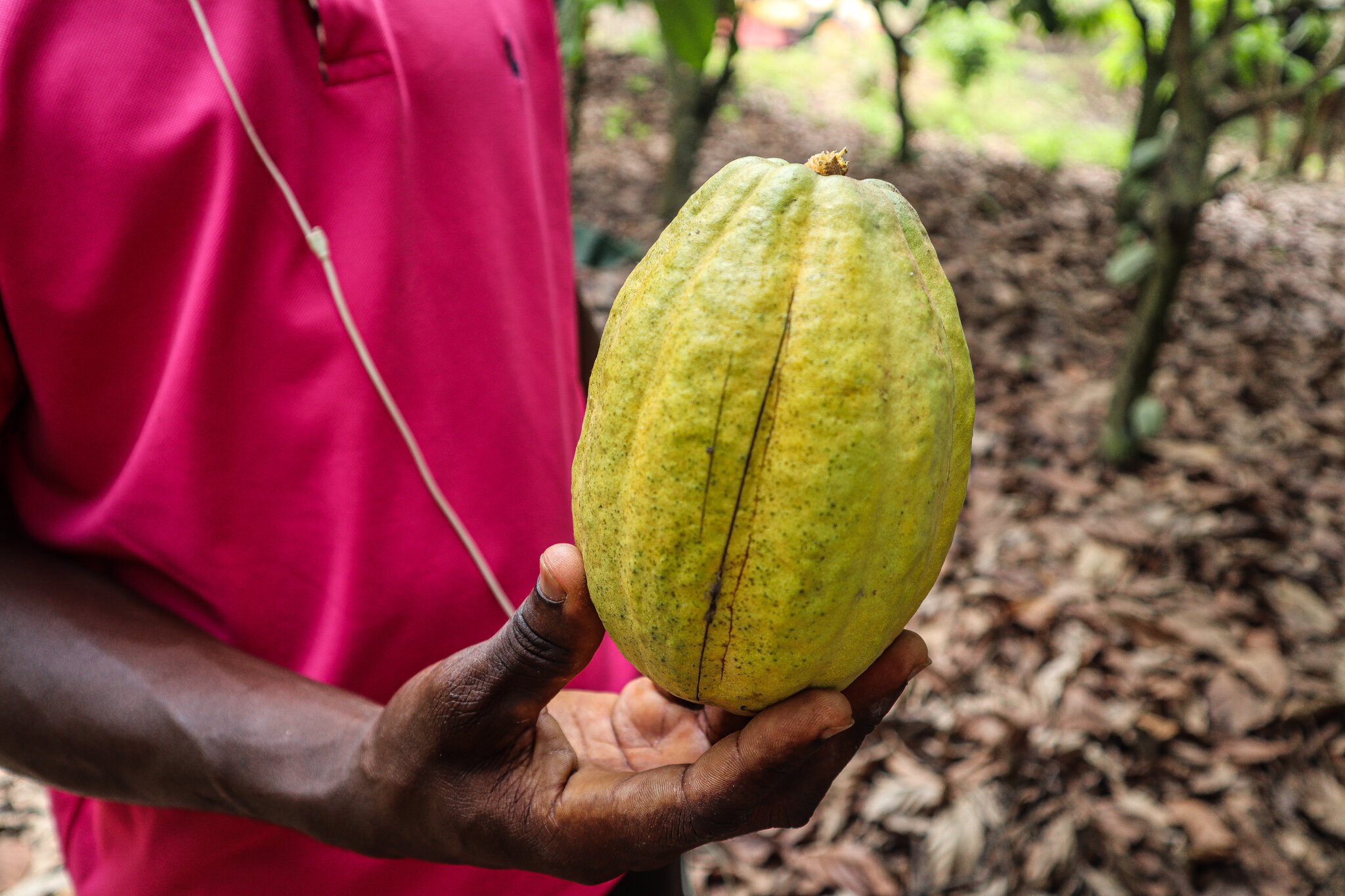In conversation with Akosua Noboa
“If you want to be a cocoa farmer you have to be very determined.”
- Akosua Noboa
Akousa Noboa, Image: MTotoe/FLO London
Cocoa is a brown powder that originates from the cocoa bean and is the key ingredient in the production of chocolate. 70% of the world’s cocoa beans come from West Africa. Ghana is presently the world’s second-largest producer of cocoa beans after Ivory Coast, which collectively produces 60% of the world's supply.
Cocoa plays a key role within the Ghanaian economy. It is produced by thousands of smallholder farmers, across six of the country's regions (Ashanti, Brong-Ahafo, Central Region, Eastern Region, Western Region, and Volta) with many households relying on income from cocoa farming. The sector is managed by the state-run marketing board COCOBOD, who set a pan–territorial and pan–seasonal price at the onset of the main harvest season in early October.
We met up with Ghanaian Cocoa farmer Akosua Noboa. Akosua is a 50-year-old cocoa farmer from Kwaman. She farms three acres of cocoa farm that produces 640kg of cocoa per acre.
Hi Akosua! Can you tell us how you begun your journey into cocoa farming?
Before I started cocoa farming I was working as a cleaner. I didn’t think I had enough of a future in cleaning so I decided I would start cocoa farming. I have an agreement with the owner of this land where I grow the cocoa and manage the farm, and I pay them a portion of my sales.
I physically work the land, but I also have some workers who help me out and I pay them daily. When it is the rainy season in Ghana we often need more help and more workers to ensure the cocoa remains healthy.
What was the process like for you to create your cocoa farm?
The cocoa tree takes approximately 4 years to grow. Once grown the tree can be producing cocoa for up to 30 years. When we were growing our cocoa trees we also used the land to grow other foods. Cocoa needs shade when it's growing so we grow plantains, casaba and cocoyam to provide that shade as the cocoa tree grew.
What does an average day look like for you?
I visit each of the cocoa trees inspecting the cocoa pod and picking those that are ripe. We have to constantly inspect the beans, as they don’t all ripen at the same time. It’s important to have good fertile soil to ensure that the cocoa pod will grow. The government helps with this by paying for farmers to spray their farms.
We strike the ripe cocoa pod for the inner beans. We then leave the beans to ferment for five days to remove the emblem and to give it that cocoa colour and flavour used to make chocolate. After the five days, we dry it in the sun. The use of sun-rays instead of machines produces higher quality beans. We then weigh it and send it to a purchasing centre.
None of the cocoa pod goes to waste; we use almost every part of it. The skin of the pod is used to produce soaps and fertilisers.
Can you slice open a ripe one for us to see?
Yes!
Cocoa pod, Image: MTotoe/FLO London
A cracked cocoa pod showing the pulp and seed that are left to ferment. Image: MTotoe/FLO London
Who purchases your cocoa?
All cocoa in Ghana is sold to the government who pay a fixed fee. We are lucky at the moment that the fee has been increasing yearly.
Image: MTotoe/FLO London
What are some of the challenges you and other cocoa farmers face?
Climate change is an issue for us cocoa farmers. The change in weather patterns and rainfall affects how much cocoa we can produce. Black pod disease (also known as Phytophthora Pod Rot, or PPR)) can also be a problem for us. This is a fungal disease that can destroy the cocoa bean.
Despite this, the financial security of knowing that you will always have a buyer in the government makes cocoa farming attractive. However, cocoa farming is expensive it is hard for many to get access to money to start a cocoa farm or even buy land to fully own their farm.
Cocoa farming is hard work. If you want to be a cocoa farmer you have to be very determined, but I enjoy it!
Finally, what do you love about Ghana?
We are a peaceful country we are also very hospitable people this makes me happy.
Click here for more interviews from our Ghana Culture Series.
Akosua and her team, Image: MTotoe/FLOLondon








